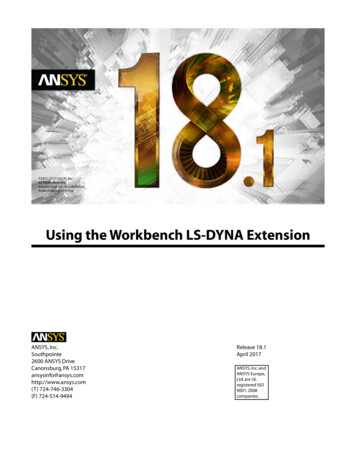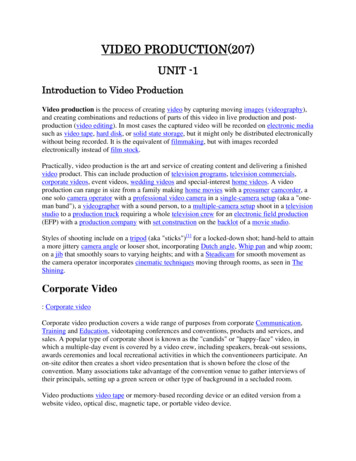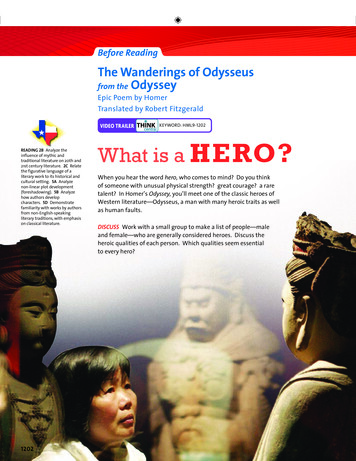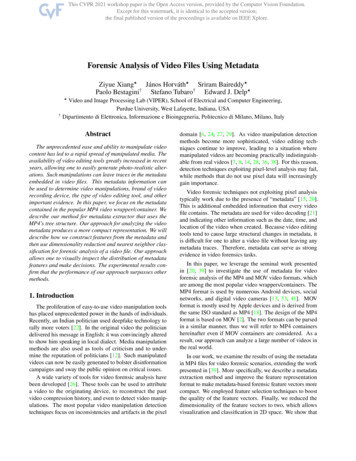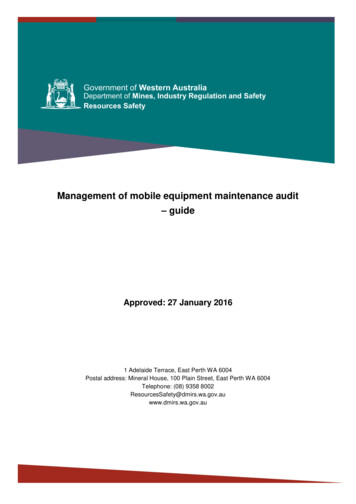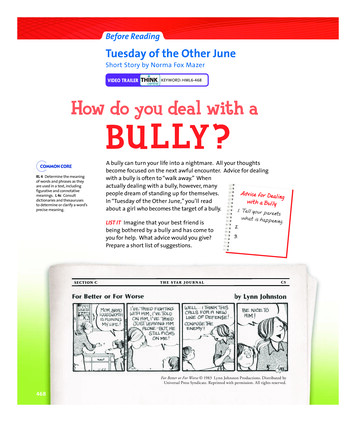
Transcription
Before ReadingTuesday of the Other JuneShort Story by Norma Fox MazerVIDEO TRAILERKEYWORD: HML6-468How do you deal with aBULLY?RL 4 Determine the meaningof words and phrases as theyare used in a text, includingfigurative and connotativemeanings. L 4c Consultdictionaries and thesaurusesto determine or clarify a word’sprecise meaning.SECTION CA bully can turn your life into a nightmare. All your thoughtsbecome focused on the next awful encounter. Advice for dealingwith a bully is often to “walk away.” Whenactually dealing with a bully, however, manyAdvice for Deapeople dream of standing up for themselves.lingIn “Tuesday of the Other June,” you’ll readwith a Bullyabout a girl who becomes the target of a bully.1. Tell your parentswhat is happening.LIST IT Imagine that your best friend is2.being bothered by a bully and has come to3.you for help. What advice would you give?Prepare a short list of suggestions.T H E S TA R J O U R N A LC5For Better or For Worse 1983 Lynn Johnston Productions. Distributed byUniversal Press Syndicate. Reprinted with permission. All rights reserved.468468-469 NA L06PE-u04s03-brTues.indd 4681/17/11 1:15:00 PM
Meet the Authortext analysis: sensory languageand imageryAuthors use many techniques to bring their characters andconflicts alive for their readers. For example, an authormight use sensory language, words or phrases that appealthe reader’s senses of sight, hearing, touch, smell, and taste.These sensory details create imagery that helps the readerimagine how things look, feel, or taste. As you read, payattention to specific details which help you picture what ishappening and how a character feels.reading strategy: connectWhen you read a story, you might find characters or eventssimilar to those you know in real life. You may even find twotexts that focus on similar themes. As you read this storyand the poem that follows, think about connections youcan make based on your own personal experiences, currentevents, and other texts. Use a diagram like the one shown.Current EventsPrior KnowledgeTuesday ofthe Other JuneOther Texts“Primer” by Rita Dovevocabulary in contextThe boldfaced words help to tell the story of a girl’sencounter with a bully. Restate each sentence usinga different word or words for the boldfaced term.1.2.3.4.5.6.The scary situation put her in a daze.Her enemy loved to torment her.Fear was reflected in her emerald eyes.June had no devoted friends to help her out.The young girl’s body went rigid with terror.Finally, she put on a dazzling display of courage.Norma Fox Mazerborn 1931Writing for PleasureBy the age of 13, Norma Fox Mazerknew that she wanted to becomea writer. With that goal in mind,she became editor of her highschool newspaper and served asa correspondent for her town’snewspaper as well.SuccessMazer went on to write fiction, andafter the success of her first book, shecontinued writing novels for youngpeople. Today she is a well-knownprize-winning writer of fiction foryoung adults. Viewing literature asa way of making sense of the world,she writes about the real problemsteenagers face.Building CharactersMazer carefully develops hercharacters before introducing themto her readers. She says, “Therecomes a time when I understandmy characters so well that I knowexactly how they will act and react atany moment, and that’s wonderful.”Mazer’s sense of her characters helpsthem come alive in her writing.AuthorOnlineGo to thinkcentral.com.KEYWORD: HML6-469Complete the activities in your Reader/Writer Notebook.469468-469 NA L06PE-u04s03-brTues.indd 4691/17/11 1:15:12 PM
TuesdayOtherJuneof theNorma Fox MazerBe good, be good, be good, be good, my Junie,” my mother sangas she combed my hair; a song, a story, a croon, a plea. “It’s justyou and me, two women alone in the world, June darling of my heart,we have enough troubles getting by, we surely don’t need a single onemore, so you keep your sweet self out of fighting and all that bad stuff.People can be little-hearted, but turn the other cheek, smile at the world,and the world’ll surely smile back.”We stood in front of the mirror as she combed my hair, combed andbrushed and smoothed. Her head came just above mine, she said whenI grew another inch she’d stand on a stool to brush my hair. “I’m notgiving up this pleasure!” And she laughed her long honey laugh. aMy mother was April, my grandmother had been May, I was June.“And someday,” said my mother, “you’ll have a daughter of your own.What will you name her?”“January!” I’d yell when I was little. “February! No, November!”My mother laughed her honey laugh. She had little emerald eyes thatwarmed me like the sun.“10470unit 4: sensory language, imagery, and style470-482 NA L06PE-u04s03-Tuesday.indd 470What sense do you getof the personalitiesof the two girls in thispainting?aIMAGERYReread lines 8–11.What details help youform a mental pictureof what is happening?emerald (DmPEr-Eld) adj.of a rich green colorDetail of Fire and Ice (2004), Brian Calvin.Acrylic on canvas, 48 60 . Courtesy of AntonKern Gallery, New York. Brian Calvin.1/17/11 1:15:44 PM
470-482 NA L06PE-u04s03-Tuesday.indd 4711/17/11 1:16:06 PM
20304050Every day when I went to school, she went to work. “SometimesI stop what I’m doing,” she said, “lay down my tools, and stop everything,because all I can think about is you. Wondering what you’re doing andif you need me. Now, Junie, if anyone ever bothers you—”“—I walk away, run away, come on home as fast as my feet will takeme,” I recited.“Yes. You come to me. You just bring me your trouble, because I’m hereon this earth to love you and take care of you.”I was safe with her. Still, sometimes I woke up at night and heardfootsteps slowly creeping up the stairs. It wasn’t my mother, she was asleepin the bed across the room, so it was robbers, thieves, and murderers,creeping slowly . . . slowly . . . slowly toward my bed.I stuffed my hand into my mouth. If I screamed and woke her, she’dbe tired at work tomorrow. The robbers and thieves filled the warmdarkness and slipped across the floor more quietly than cats. Rigidunder the covers, I stared at the shifting dark and bit my knucklesand never knew when I fell asleep again. bIn the morning we sang in the kitchen. “Bill Grogan’s goat! Was feelin’fine! Ate three red shirts, right off the line!” I made sandwiches for ourlunches, she made pancakes for breakfast, but all she ate was one pancakeand a cup of coffee. “Gotta fly, can’t be late.”I wanted to be rich and take care of her. She worked too hard; herpretty hair had gray in it that she joked about. “Someday,” I said, “I’ll buyyou a real house, and you’ll never work in a pot factory again.” c“Such delicious plans,” she said. She checked the windows to see if theywere locked. “Do you have your key?”I lifted it from the chain around my neck.“And you’ll come right home from school and—”“—I won’t light fires or let strangers into the house, and I won’t tellanyone on the phone that I’m here alone,” I finished for her.“I know, I’m just your old worrywart mother.” She kissed metwice, once on each cheek. “But you are my June, my only June, theonly June.”She was wrong; there was another June. I met her when we stood nextto each other at the edge of the pool the first day of swimming classin the Community Center.“What’s your name?” She had a deep growly voice.“June. What’s yours?”She stared at me. “June.”“We have the same name.”472rigid (rGjPGd) adj. stiff; notmovingbSENSORY LANGUAGEReread lines 26–34.What details help youpicture the nights whenJune gets scared?cCONNECTWhat does June wantfor her mother? Haveyou ever had similarfeelings? Write them inyour chart.L 4cLanguage CoachDefinitions The wordworrywart (line 48)refers to someone whoworries needlesslyabout things to come.Use a dictionary tofind a synonym for“worrywart.”unit 4: sensory language, imagery, and style470-482 NA L06PE-u04s03-Tuesday.indd 4721/17/11 1:16:10 PM
6070“No we don’t. June is my name, and I don’t give you permission to useit. Your name is Fish Eyes.” She pinched me hard. “Got it, Fish Eyes?”The next Tuesday, the Other June again stood next to me at the edgeof the pool. “What’s your name?”“June.”“Wrong. sh Eyes, you are really stupid.” She shoved me into the pool.The swimming teacher looked up, frowning, from her chart. “No onein the water yet.”Later, in the locker room, I dressed quickly and wrapped my wet suitin the towel. The Other June pulled on her jeans. “You guys see thatbathing suit Fish Eyes was wearing? Her mother found it in a trash can.”How do the details inthis work of art connectwith the story?Left panel of Le Plongeur (Paper Pool 18) (1978), David Hockney. Colored and pressed paper pulp. 72 x171 . David Hockney/Bradford Art Galleries and Museums, West Yorkshire, United Kingdom/Bridgeman Art Library.470-482 NA L06PE-u04s03-Tuesday.indd 4731/17/11 1:16:26 PM
8090100“She did not!”The Other June grabbed my fingers and twisted. “Where’d she findyour bathing suit?”“She bought it, let me go.”“Poor little stupid Fish Eyes is crying. Oh, boo hoo hoo, poor littleFish Eyes.”After that, everyone called me Fish Eyes. And every Tuesday, whereverI was, there was also the Other June—at the edge of the pool, in the pool,in the locker room. In the water, she swam alongside me, blowing andhuffing, knocking into me. In the locker room, she stepped on my feet,pinched my arms, hid my blouse, and knotted my braids together. Shehad large square teeth; she was shorter than I was, but heavier, with biggerbones and square hands. If I met her outside on the street, carrying herbathing suit and towel, she’d walk toward me, smiling a square, friendlysmile. “Oh well, if it isn’t Fish Eyes.” Then she’d punch me, blam! herwhole solid weight hitting me. dI didn’t know what to do about her. She was training me like a dog.After a few weeks of this, she only had to look at me, only had to growl,“I’m going to get you, Fish Eyes,” for my heart to slink like a whipped dogdown into my stomach. My arms were covered with bruises. When mymother noticed, I made up a story about tripping on the sidewalk. eMy weeks were no longer Tuesday, Wednesday, Thursday, and soon. Tuesday was Awfulday. Wednesday was Badday. (The Tuesday badfeelings were still there.) Thursday was Betterday and Friday was Safeday.Saturday was Goodday, but Sunday was Toosoonday, and Monday—Monday was nothing but the day before Awfulday.I tried to slow down time. Especially on the weekends, I stayed closeby my mother, doing everything with her, shopping, cooking, cleaning,going to the laundromat. “Aw, sweetie, go play with your friends.”“No, I’d rather be with you.” I wouldn’t look at the clock or listento the radio (they were always telling you the date and the time).I did special magic things to keep the day from going away, rapping myknuckles six times on the bathroom door six times a day and never, evertouching the chipped place on my bureau. But always I woke up to theday before Tuesday, and always, no matter how many times I circled theworn spot in the living-room rug or counted twenty-five cracks in theceiling, Monday disappeared and once again it was Tuesday. fThe Other June got bored with calling me Fish Eyes. Buffalo Brain camenext, but as soon as everyone knew that, she renamed me Turkey Nose.474dIMAGERYWhat sensory languagedoes the author use tohelp you imagine thebully’s behavior towardsJune?eCONNECTHave you read any otherstories about bullies?Is June’s reaction toher bully similar ordifferent from whathas happened in otherstories?fIMAGERYReread lines 100–107.What images helpyou understand howJune feels about hersituation?unit 4: sensory language, imagery, and style470-482 NA L06PE-u04s03-Tuesday.indd 4741/17/11 1:16:28 PM
110120130140Now at night it wasn’t robbers creeping up the stairs, but the OtherJune, coming to torment me. When I finally fell asleep, I dreamedof kicking her, punching, biting, pinching. In the morning I rememberedmy dreams and felt brave and strong. And then I remembered all thethings my mother had taught me and told me.Be good, be good, be good; it’s just us two women alone in the world . . .Oh, but if it weren’t, if my father wasn’t long gone, if we’d had someoneelse to fall back on, if my mother’s mother and daddy weren’t dead allthese years, if my father’s daddy wanted to know us instead of being gladto forget us—oh, then I would have punched the Other June with a friskyheart, I would have grabbed her arm at poolside and bitten her like thedog she had made of me. gOne night, when my mother came home from work, she said, “Junie,listen to this. We’re moving!”Alaska, I thought. Florida. Arizona. Someplace far away and wonderful,someplace without the Other June.“Wait till you hear this deal. We are going to be caretakers,trouble-shooters for an eight-family apartment building. Fifty-six BlueHill Street. Not janitors; we don’t do any of the heavy work. April andJune, Trouble-shooters, Incorporated. If a tenant has a complaintor a problem, she comes to us and we either take care of it or call thejanitor for service. And for that little bit of work, we get to live rentfree!” She swept me around in a dance. “Okay? You like it? I do!”So. Not anywhere else, really. All the same, maybe too far to goto swimming class? “Can we move right away? Today?”“Gimme a break, sweetie. We’ve got to pack, do a thousand things.I’ve got to line up someone with a truck to help us. Six weeks, Saturdaythe fifteenth.” She circled it on the calendar. It was the Saturday afterthe last day of swimming class.Soon, we had boxes lying everywhere, filled with clothes and towelsand glasses wrapped in newspaper. Bit by bit, we cleared the rooms,leaving only what we needed right now. The dining-room table staggeredon a bunched-up rug, our bureaus inched toward the front door likepatient cows. On the calendar in the kitchen, my mother marked offthe days until we moved, but the only days I thought about wereTuesdays—Awfuldays. Nothing else was real except the too fast passingof time, moving toward each Tuesday . . . away from Tuesday . . . towardTuesday. . . . htorment (tôrPmDntQ) v.to cause severe distressto the body or mindgCONNECTIn line 115, Juneremembers her mother’sadvice to be good. Doyou think it’s betteradvice to “be good” orto take revenge on theOther June? Explain.RL 4hPERSONIFICATIONPersonification occurswhen an author giveshuman qualities to ananimal, object, or idea.Reread lines 141–147.What objects or ideasare personified in theselines? What effect doesthis have on you as areader? As you read therest of the story, lookfor other examples ofpersonification.tuesday of the other june470-482 NA L06PE-u04s03-Tuesday.indd 4754751/17/11 1:16:28 PM
150160And it seemed to me that this would go on forever, that Tuesdays wouldcome forever and I would be forever trapped by the side of the pool, theOther June whispering Buffalo Brain Fish Eyes Turkey Nose into my ear,while she ground her elbow into my side and smiled her square smileat the swimming teacher.And then it ended. It was the last day of swimming class. The lastTuesday. We had all passed our tests, and, as if in celebration, the OtherJune only pinched me twice. “And now,” our swimming teacher said, “allof you are ready for the Advanced Class, which starts in just one month.I have a sign-up slip here. Please put your name down before you leave.”Everyone but me crowded around. I went to the locker room and pulled onmy clothes as fast as possible. The Other June burst through the doorjust as I was leaving. “Goodbye,” I yelled, “good riddance to bad trash!”Before she could pinch me again, I ran past her and then ran all the wayhome, singing, “Goodbye . . . goodbye . . . goodbye, good riddanceto bad trash!”GRAMMAR INCONTEXTThe tense of a verbindicates the time ofan action or a state ofbeing. An action canhappen in the present,the past, or the future.The verbs ended, was,had, and pinched in lines153–155 tell you thatthese actions take placein the past.L170180ater, my mother carefully untied the blue ribbon around my swimmingclass diploma. “Look at this! Well, isn’t this wonderful! You are onyour way, you might turn into an Olympic swimmer, you never knowwhat life will bring.”“I don’t want to take more lessons.”“Oh, sweetie, it’s great to be a good swimmer.” But then, looking intomy face, she said, “No, no, no, don’t worry, you don’t have to.”The next morning, I woke up hungry for the first time in weeks.No more swimming class. No more Baddays and Awfuldays. No moreTuesdays of the Other June. In the kitchen, I made hot cocoa to go withmy mother’s corn muffins. “It’s Wednesday, Mom,” I said, stirring thecocoa. “My favorite day.”“Since when?”“Since this morning.” I turned on the radio so I could hear theannouncer tell the time, the temperature, and the day.Thursday for breakfast I made cinnamon toast, Friday my mother madepancakes, and on Saturday, before we moved, we ate the last slices ofbread and cleaned out the peanut butter jar.“Some breakfast,” Tilly said. “Hello, you must be June.” She shookmy hand. She was a friend of my mother’s from work; she wore big hoopearrings, sandals, and a skirt as dazzling as a rainbow. She camein a truck with John to help us move our things.John shouted cheerfully at me, “So you’re moving.” An enormous manwith a face covered with little brown bumps. Was he afraid his voicewouldn’t travel the distance from his mouth to my ear? “You looking476dazzling (dBzPlGng) adj.beautiful; amazingdazzle v.unit 4: sensory language, imagery, and style470-482 NA L06PE-u04s03-Tuesday.indd 4761/17/11 1:16:28 PM
190200at my moles?” he shouted, and he heaved our big green flowered chairdown the stairs. “Don’t worry, they don’t bite. Ha, ha, ha!” Behind himcame my mother and Tilly balancing a bureau between them, and behindthem I carried a lamp and the round, flowered Mexican tray that was mymother’s favorite. She had found it at a garage sale and said it was as closeto foreign travel as we would ever get.The night before, we had loaded our car, stuffing in bags and boxesuntil there was barely room for the two of us. But it was only when wewere in the car, when we drove past Abdo’s Grocery, where they alwaysgave us credit,1 when I turned for a last look at our street—it was onlythen that I understood we were truly going to live somewhere else, inanother apartment, in another place mysteriously called Blue Hill Street. iTilly’s truck followed our car.“Oh, I’m so excited,” my mother said. She laughed. “You’d thinkwe were going across the country.”Our old car wheezed up a long steep hill. Blue Hill Street. I looked fromone side to the other, trying to see everything.My mother drove over the crest of the hill. “And now—ta da!—ournew home.”L 4cLanguage CoachSynonyms The wordbureau (line 191) meansa chest of drawers. Usea thesaurus to find otherwords that describe achest of drawers.iCONNECTAs they are driving awayfrom their home, Junesuddenly realizes thather life is going to startanew elsewhere. Haveyou ever had to move?How did you feel aboutmoving to a new place?1. credit: an agreement to trust in someone’s ability and intention to pay for something at a later date.tuesday of the other june470-482 NA L06PE-u04s03-Tuesday.indd 4774771/17/11 1:16:28 PM
210220230“Which house? Which one?” I looked out the window and whatI saw was the Other June. She was sprawled on the stoop of a pink house,lounging back on her elbows, legs outspread, her jaws working on a wadof gum. I slid down into the seat, but it was too late. I was sure she hadseen me.My mother turned into a driveway next to a big white building witha tiny porch. She leaned on the steering wheel. “See that window there,that’s our living-room window. . . and that one over there, that’s yourbedroom. . . .”We went into the house, down a dim, cool hall. In our new apartment,the wooden floors clicked under our shoes, and my mother showed meeverything. Her voice echoed in the empty rooms. I followed her aroundin a daze. Had I imagined seeing the Other June? Maybe I’d seen anothergirl who looked like her. A double. That could happen. j“Ho yo, where do you want this chair?” John appeared in the doorway.We brought in boxes and bags and beds and stopped only to eat pizza anddrink orange juice from the carton.“June’s so quiet, do you think she’ll adjust all right?” I heard Tilly sayto my mother.“Oh, definitely. She’ll make a wonderful adjustment. She’s just gettingused to things.”But I thought that if the Other June lived on the same street as I did,I would never get used to things.daze (dAz) n. a conditionin which one cannotthink clearlyjSENSORY LANGUAGEReread lines 217–221.Which details help youpicture what it looks likeinside the house andhow it feels to be there?T240hat night I slept in my own bed, with my own pillow and blanket,but with floors that creaked in strange voices and walls with cracksI didn’t recognize. I didn’t feel either happy or unhappy. It was as if I werewaiting for something.Monday, when the principal of Blue Hill Street School left me inMr. Morrisey’s classroom, I knew what I’d been waiting for. In that roomfull of strange kids, there was one person I knew. She smiled her squaresmile, raised her hand, and said, “She can sit next to me, Mr. Morrisey.”“Very nice of you, June M. OK, June T, take your seat. I’ll try notto get you two Junes mixed up.”I sat down next to her. She pinched my arm. “Good riddance to badtrash,” she mocked.I was back in the Tuesday swimming class, only now it was worse,because every day would be Awfulday. The pinching had already started.Soon, I knew, on the playground and in the halls, kids would pass me,grinning. “Hiya, Fish Eyes.”478unit 4: sensory language, imagery, and style470-482 NA L06PE-u04s03-Tuesday.indd 478How does this paintingcompare with yourmental picture of June’snew neighborhood?Detail of Potrero (2005), Michael Shankman.Oil on canvas, 18 72 . 2005 MichaelShankman. All rights reserved.1/17/11 1:16:34 PM
tuesday of the other june470-482 NA L06PE-u04s03-Tuesday.indd 4794791/17/11 1:16:34 PM
250260270280The Other June followed me around during recess that day, droningin my ear, “You are my slave, you must do everything I say, I am yourmaster, say it, say, ‘Yes, master, you are my master.’”I pressed my lips together, clapped my hands over my ears, but withouthope. Wasn’t it only a matter of time before I said the hateful words?“How was school?” my mother said that night.“OK.”She put a pile of towels in a bureau drawer. “Try not to be sad aboutmissing your old friends, sweetie; there’ll be new ones.”The next morning, the Other June was waiting for me when I leftthe house. “Did your mother get you that blouse in the garbage dump?”She butted me, shoving me against a tree. “Don’t you speak anymore,Fish Eyes?” Grabbing my chin in her hands, she pried open my mouth.“Oh, ha ha, I thought you lost your tongue.”We went on to school. I sank down into my seat, my head on my arms.“June T, are you all right?” Mr. Morrisey asked. I nodded. My head wasalmost too heavy to lift.The Other June went to the pencil sharpener. Round and round shewhirled the handle. Walking back, looking at me, she held the three sharppencils like three little knives.Someone knocked on the door. Mr. Morrisey went out into the hall.Paper planes burst into the air, flying from desk to desk. Someone turnedon a transistor radio. And the Other June, coming closer, smiled andlicked her lips like a cat sleepily preparing to gulp down a mouse.I remembered my dream of kicking her, punching, biting her like a dog.Then my mother spoke quickly in my ear: Turn the other cheek,my Junie; smile at the world, and the world’ll surely smile back.But I had turned the other cheek and it was slapped. I had smiledand the world hadn’t smiled back. I couldn’t run home as fast as my feetwould take me, I had to stay in school—and in school there was the OtherJune. Every morning, there would be the Other June, and every afternoon,and every day, all day, there would be the Other June. kShe frisked down the aisle, stabbing the pencils in the air toward me.A boy stood up on his desk and bowed. “My fans,” he said, “I greet you.”My arm twitched and throbbed, as if the Other June’s pencils had alreadypoked through the skin. She came closer, smiling her Tuesday smile.“No,” I whispered, “no.” The word took wings and flew me to my feet,in front of the Other June. “Noooooo.” It flew out of my mouth into hersurprised face.The boy on the desk turned toward us. “You said something, mydevoted fans?”480L 4cLanguage CoachMultiple-MeaningWords The wordrecess (line 247) meansa temporary pauseor break from work.Students usually haverecess to relax and play.However, recess canalso be used to describea hollow space in awall. Use a dictionaryto find out what recessmeans when used as averb instead of a noun.kCONNECTKnowing what you doabout bullies, what doyou think June is goingto do if the Other Juneattacks her?devoted (dG-vIPtGd)adj. very loyal; faithfuldevote v.unit 4: sensory language, imagery, and style470-482 NA L06PE-u04s03-Tuesday.indd 4801/17/11 1:16:46 PM
Detail of Fire and Ice (2004), Brian Calvin. Acrylic on canvas, 48 60 . Courtesy of Anton Kern Gallery,New York. Brian Calvin.290300“No,” I said to the Other June. “Oh, no! No. No. No. No more.”I pushed away the hand that held the pencils.The Other June’s eyes opened, popped wide like the eyes of somebodyin a cartoon. It made me laugh. The boy on the desk laughed, and thenthe other kids were laughing, too.“No,” I said again, because it felt so good to say it. “No, no, no, no.”I leaned toward the Other June, put my finger against her chest. Her cheeksturned red, she squawked something—it sounded like “Eeeraaghyou!”—and she stepped back. She stepped away from me.The door banged, the airplanes disappeared, and Mr. Morrisey walkedto his desk. “OK. OK. Let’s get back to work. Kevin Clark, how aboutit?” Kevin jumped off the desk and Mr. Morrisey picked up a pieceof chalk. “All right, class—” He stopped and looked at me and theOther June. “You two Junes, what’s going on there?”I tried it again. My finger against her chest. Then the words.“No—more.” And she stepped back another step. I sat down at my desk.“June M,” Mr. Morrisey said.She turned around, staring at him with that big-eyed cartoon look.After a moment she sat down at the desk with a loud slapping sound.Even Mr. Morrisey laughed.And sitting at my desk, twirling my braids, I knew this was the lastTuesday of the Other June. llSENSORY LANGUAGEHow do the sensorylanguage and detailsin lines 302–309 helpyou imagine the scene?What does the authormean by “the lastTuesday of the OtherJune”?tuesday of the other june470-482 NA L06PE-u04s03-Tuesday.indd 4814811/17/11 1:16:46 PM
Connect: PoemRita Dove510In the sixth grade I was chased home bythe Gatlin Kids, three skinny sistersin rolled-down bobby socks.1 HissingBrainiac! And Mrs. Stringbean!, they trod my heel.I knew my body was no big dealbut never thought to retort:2 who’scalling who skinny? (Besides, I knewthey’d beat me up.) I survivedtheir shoves across the schoolyardbecause my five-foot-zero mother drove upin her Caddie3 to shake them down to size.Nothing could get me into that car.I took the long way home, sworeI’d show them all: I would grow up.1. bobby socks: 1940s and 1950s term for socks reaching just above theankle.2. retort: answer back in a sharp way.3. Caddie: Cadillac, a type of car.482unit 4: sensory language, imagery, and style470-482 NA L06PE-u04s03-Tuesday.indd 4821/17/11 1:16:54 PM
After ReadingComprehension1. Recall What is June’s mother’s approach to dealing with life’s difficulties?2. Recall What unpleasant discovery does June make on moving day?3. Represent Reread lines 92–96. Create a weekly calendar showing thedays of the week and June’s nickname for each.Text AnalysisRL 4 Determine the meaning ofwords and phrases as they are usedin a text, including connotativemeanings. RL 9 Compare andcontrast texts in different formsin terms of their approachesto similar topics. SL 1 Engagein collaborative discussions (ingroups).4. Identify Imagery June, the narrator of the story, uses sensory details todescribe the house she shares with her mother. Review the story and findexamples of these details. Then, write a sentence describing the house.5. Analyze Sensory Language Go back to the story and look for descriptionsof the narrator. How does the author create a full picture of June,including her inner feelings? Find examples of words and phrases thathelp you identify how June looks and feels.6. Analyze Character Think about the type of person June’s mother is. Howdoes her personality and behavior affect June? Does she give June goodadvice? Use evidence from the story to support your response.7. Connect Review the chart that you filledout as you read the story. Does the storyremind you of any other events, personal orfictional? Explain.8. Connect Reread Rita Dove’s poem on page482. How is the speaker, or voice, of thepoem like June the narrator? Use examplesfrom each selection to support your answer.Current EventsPrior KnowledgeTuesday ofthe Other JuneOther Texts“Primer” by Rita DoveExtension and Challenge9. Readers’ Circle With a small group, discuss the way June deals with theOther June. In what other way could she have responded? Did June dothe right thing?How do you deal with a BULLY?Write a list of options for someone dealing with a bully. Think about Junefrom “Tuesday of the Other June” and the speaker in “Primer.”tuesday of the other june483-485 NA L06PE-u04s03-arTues.indd 4834831/17/11 1:17:30 PM
Vocabulary in Contextvocabulary practiceChoose the letter of the word or phrase you would associatewith each boldfaced vocabulary word.dazedazzling1. Emerald is a shade of (a) gray, (b) blue, (c) green.devoted2. A person in a daze is (a) excited, (b) confused, (c) goodat sports.3. (a) An enemy, (b) A vacation, (c) A prize might
Online 468-469_NA_L06PE-u04s03-brTues.indd 469 1/17/11 1:15:12 PM. B e good, be good, be good, be good, my Junie,” my mother sang as she combed my hair; a song, a story, a croon, a plea. “It’s just you and me, two women alone in the world, June darling of my heart, . Detail of Fire and Ice


